Deck 2: Daily Health Observations
Question
Question
Question
Question
Question
Question
Question
Question
Question
Question
Question
Question
Question
Question
Question
Question
Question
Question
Question
Question
Question
Question
Question
Question
Question
Question
Question
Question
Question
Question
Question

Unlock Deck
Sign up to unlock the cards in this deck!
Unlock Deck
Unlock Deck
1/31
Play
Full screen (f)
Deck 2: Daily Health Observations
1
Examine and describe your feelings about conducting daily health checks in a reflective journal entry. Do you think all beginning teachers have similar feelings Outline several steps you might take to improve your observational skills and gain confidence in identifying children's health problems.
Daily health checks allow teachers to protect the health of individual students as well as all students in their charge. Daily health checks also allow teachers to teach students about health-related topics such as personal hygiene and the importance physical activity. Safeguarding students' health promotes learning by preventing distractions caused by illness and allowing students to be engaged learners.
Describe your feelings about the importance of performing daily health checks on students. What value do you feel this has in their education Do you feel that it is appropriate for teachers to perform health checks Do you feel that it oversteps boundaries How confident are you in performing health checks Are you comfortable addressing concerns about a student's health with their family How important to a students' health are the observations made by teachers
Think about the steps you might take to improve your observational skills when performing health checks. Keep in mind Teacher Checklist 2-1. Some steps you might consider:
• Have a system; make observations in the same order every time. For example, look for obvious scrapes or injuries to the skin, and then look at posture, nasal drainage, and so on.
• Make detailed notes; stating that a child seems unwell is uninformative. Write information such as the measured temperature if a child is running a fever, the appearance of the skin (red, raised blemishes, dry patches, etc.), or behavior (irritability, sadness).
Describe your feelings about the importance of performing daily health checks on students. What value do you feel this has in their education Do you feel that it is appropriate for teachers to perform health checks Do you feel that it oversteps boundaries How confident are you in performing health checks Are you comfortable addressing concerns about a student's health with their family How important to a students' health are the observations made by teachers
Think about the steps you might take to improve your observational skills when performing health checks. Keep in mind Teacher Checklist 2-1. Some steps you might consider:
• Have a system; make observations in the same order every time. For example, look for obvious scrapes or injuries to the skin, and then look at posture, nasal drainage, and so on.
• Make detailed notes; stating that a child seems unwell is uninformative. Write information such as the measured temperature if a child is running a fever, the appearance of the skin (red, raised blemishes, dry patches, etc.), or behavior (irritability, sadness).
2
Learning becomes more meaningful for children when it:
a. is presented in the context of everyday experiences.
b. addresses novel information.
c. is provided during formal lessons.
d. challenges children's curiosity.
a. is presented in the context of everyday experiences.
b. addresses novel information.
c. is provided during formal lessons.
d. challenges children's curiosity.
Daily health checks provide teachers with an opportunity to provide a safeguard to the health of the students in their classroom. Children are better able to comprehend information when it is presented in the context of daily life because they are able to relate to the information. Simply presenting facts to a child does not provide them context in which to apply the information. The correct answer is a., is presented in the context of everyday experiences.
3
What suggestions would you have for a preschool teacher who says he is too busy to conduct daily health checks
Completing daily health checks provides a benefit to students in that ill students can be identified and removed from the classroom to prevent the spread of illness. To quickly and efficiently complete health checks, teachers should develop a protocol that they follow rigorously; this will allow them to complete health checks efficiently by following the same sequence of observations. They might prepare a printed checklist to ensure they are thorough and can quickly recall all health observations that need to be made. A checklist can also help with record keeping and should include a section for specific notes when a child presents an unusual symptom or behavior. Daily health checks should be performed in a designated area of the classroom to help improve teacher efficiency and consistency in performing health checks as well as provide a measure of comfort for students. The health check area can be stocked with note-taking material to help health checks be completed faster.
4
High drop-out rates among school-age children continue to attract national attention. According to several recent studies, many of these children have undiagnosed health problems, such as vision and hearing impairments, allergies, asthma, and anemia, which interfere with their ability to learn and to succeed in school. After years of struggle and failure, some children simply choose to abandon the source of their frustration.
The visionary founders of Head Start clearly understood the importance of early identification and treatment of health problems to ensure that children were ready and able to learn upon entering school. The same preventive philosophy is evident in the Healthy People 2020 goals and reinforces the valuable role teachers play in assessing and promoting children's well-being.
Think About This:
Should inservice and teacher education programs include more training about children's health care needs Explain.
In what ways do state child-care licensing regulations encourage teachers to be proactive in protecting children's health and safety
What right does a teacher have to insist that children receive treatment for their health problems Explain.
What health care options exist for children whose families cannot afford needed treatments
The visionary founders of Head Start clearly understood the importance of early identification and treatment of health problems to ensure that children were ready and able to learn upon entering school. The same preventive philosophy is evident in the Healthy People 2020 goals and reinforces the valuable role teachers play in assessing and promoting children's well-being.
Think About This:
Should inservice and teacher education programs include more training about children's health care needs Explain.
In what ways do state child-care licensing regulations encourage teachers to be proactive in protecting children's health and safety
What right does a teacher have to insist that children receive treatment for their health problems Explain.
What health care options exist for children whose families cannot afford needed treatments

Unlock Deck
Unlock for access to all 31 flashcards in this deck.
Unlock Deck
k this deck
5
Chris, the head teacher in the Sunflower classroom, has recently had some concerns about Lynette's vision. He has noticed that during group story time, Lynette quickly loses interest, often leaves her place in the circle, and crawls closer to him in an apparent effort to see the pictures in books he is holding up. Chris has also observed that when Lynette is working on puzzles, manipulatives, or an art project, she typically lowers her head close to the objects. Lynette's parents have also expressed concern about her clumsiness at home.
The results of two vision screening tests, administered by the school nurse on different days, suggest that Lynette's vision is not within normal limits. The nurse shared these findings during a conference with Lynette's parents, and encouraged them to arrange for a follow-up evaluation with an eye specialist. However, because Lynette's father was recently laid off from his job, they no longer have health insurance and cannot afford a doctor's visit at this time. The nurse continued to work closely with the family and helped them locate two reduced-fee health clinics in their community that provided the type of services Lynette required.
If you were the nurse advising Lynette's parents, what free or low-cost health service options could you recommend in your community
The results of two vision screening tests, administered by the school nurse on different days, suggest that Lynette's vision is not within normal limits. The nurse shared these findings during a conference with Lynette's parents, and encouraged them to arrange for a follow-up evaluation with an eye specialist. However, because Lynette's father was recently laid off from his job, they no longer have health insurance and cannot afford a doctor's visit at this time. The nurse continued to work closely with the family and helped them locate two reduced-fee health clinics in their community that provided the type of services Lynette required.
If you were the nurse advising Lynette's parents, what free or low-cost health service options could you recommend in your community

Unlock Deck
Unlock for access to all 31 flashcards in this deck.
Unlock Deck
k this deck
6
Define each of the Terms to Know listed at the end of this chapter.

Unlock Deck
Unlock for access to all 31 flashcards in this deck.
Unlock Deck
k this deck
7
What are some things teachers can do to get families more involved in their child's preventive health care

Unlock Deck
Unlock for access to all 31 flashcards in this deck.
Unlock Deck
k this deck
8
Describe the resources available to teachers for gathering information about a child's health.

Unlock Deck
Unlock for access to all 31 flashcards in this deck.
Unlock Deck
k this deck
9
What describes the teacher's role in using health assessment screening tools
a. Teachers can use some screening tools.
b. Teachers are forbidden by law to use screening tools.
c. Teachers can use some screening tools, but they should not use them.
d. Teachers can use all screening tools.
a. Teachers can use some screening tools.
b. Teachers are forbidden by law to use screening tools.
c. Teachers can use some screening tools, but they should not use them.
d. Teachers can use all screening tools.

Unlock Deck
Unlock for access to all 31 flashcards in this deck.
Unlock Deck
k this deck
10
Chris, the head teacher in the Sunflower classroom, has recently had some concerns about Lynette's vision. He has noticed that during group story time, Lynette quickly loses interest, often leaves her place in the circle, and crawls closer to him in an apparent effort to see the pictures in books he is holding up. Chris has also observed that when Lynette is working on puzzles, manipulatives, or an art project, she typically lowers her head close to the objects. Lynette's parents have also expressed concern about her clumsiness at home.
The results of two vision screening tests, administered by the school nurse on different days, suggest that Lynette's vision is not within normal limits. The nurse shared these findings during a conference with Lynette's parents, and encouraged them to arrange for a follow-up evaluation with an eye specialist. However, because Lynette's father was recently laid off from his job, they no longer have health insurance and cannot afford a doctor's visit at this time. The nurse continued to work closely with the family and helped them locate two reduced-fee health clinics in their community that provided the type of services Lynette required.
What behaviors did Lynette exhibit that made her teacher suspect some type of vision disorder
The results of two vision screening tests, administered by the school nurse on different days, suggest that Lynette's vision is not within normal limits. The nurse shared these findings during a conference with Lynette's parents, and encouraged them to arrange for a follow-up evaluation with an eye specialist. However, because Lynette's father was recently laid off from his job, they no longer have health insurance and cannot afford a doctor's visit at this time. The nurse continued to work closely with the family and helped them locate two reduced-fee health clinics in their community that provided the type of services Lynette required.
What behaviors did Lynette exhibit that made her teacher suspect some type of vision disorder

Unlock Deck
Unlock for access to all 31 flashcards in this deck.
Unlock Deck
k this deck
11
The first step a teacher should take when using observation to monitor a child's health and development is to:
a. note any and all changes
b. note changes that have the potential to affect learning
c. identify attainable goals
d. establish a baseline for each child
a. note any and all changes
b. note changes that have the potential to affect learning
c. identify attainable goals
d. establish a baseline for each child

Unlock Deck
Unlock for access to all 31 flashcards in this deck.
Unlock Deck
k this deck
12
Health impairments can have a profound effect on a student's ability to concentrate and learn successfully. The most critical step to overcoming these prospective barriers is
a. accommodation.
b. counseling.
c. medical or behavioral intervention.
d. detection.
a. accommodation.
b. counseling.
c. medical or behavioral intervention.
d. detection.

Unlock Deck
Unlock for access to all 31 flashcards in this deck.
Unlock Deck
k this deck
13
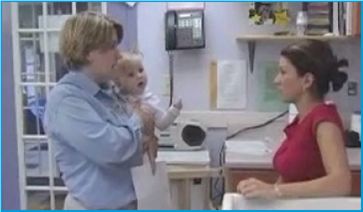
Infants and Toddlers: Daily Health Checks
Children's ability to learn is affected by their state of well-being. Because young children are highly susceptible and prone to infectious illnesses, it is important that teachers conduct daily health checks. As you watch the learning video, Infants and Toddlers: Daily Health Checks , consider the following questions:
Why should health checks be conducted daily

Unlock Deck
Unlock for access to all 31 flashcards in this deck.
Unlock Deck
k this deck
14
Explain how health status affects a child's ability to learn.

Unlock Deck
Unlock for access to all 31 flashcards in this deck.
Unlock Deck
k this deck
15
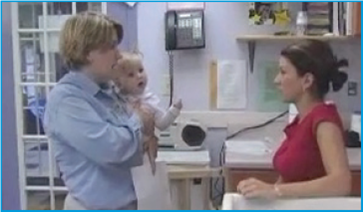
Infants and Toddlers: Daily Health Checks
Children's ability to learn is affected by their state of well-being. Because young children are highly susceptible and prone to infectious illnesses, it is important that teachers conduct daily health checks. As you watch the learning video, Infants and Toddlers: Daily Health Checks , consider the following questions:
Why is it important that teachers spend time interacting with parents as part of their daily health checks

Unlock Deck
Unlock for access to all 31 flashcards in this deck.
Unlock Deck
k this deck
16
Describe the health check routine. What common health problems/conditions should teachers look for

Unlock Deck
Unlock for access to all 31 flashcards in this deck.
Unlock Deck
k this deck
17
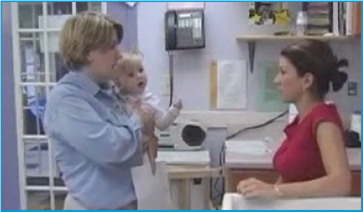
Infants and Toddlers: Daily Health Checks
Children's ability to learn is affected by their state of well-being. Because young children are highly susceptible and prone to infectious illnesses, it is important that teachers conduct daily health checks. As you watch the learning video, Infants and Toddlers: Daily Health Checks , consider the following questions:
What are the best times of the day to perform a daily health check on an infant or toddler

Unlock Deck
Unlock for access to all 31 flashcards in this deck.
Unlock Deck
k this deck
18
Chris, the head teacher in the Sunflower classroom, has recently had some concerns about Lynette's vision. He has noticed that during group story time, Lynette quickly loses interest, often leaves her place in the circle, and crawls closer to him in an apparent effort to see the pictures in books he is holding up. Chris has also observed that when Lynette is working on puzzles, manipulatives, or an art project, she typically lowers her head close to the objects. Lynette's parents have also expressed concern about her clumsiness at home.
The results of two vision screening tests, administered by the school nurse on different days, suggest that Lynette's vision is not within normal limits. The nurse shared these findings during a conference with Lynette's parents, and encouraged them to arrange for a follow-up evaluation with an eye specialist. However, because Lynette's father was recently laid off from his job, they no longer have health insurance and cannot afford a doctor's visit at this time. The nurse continued to work closely with the family and helped them locate two reduced-fee health clinics in their community that provided the type of services Lynette required.
Identify the sources from which information concerning Lynette's vision problem was obtained before she was referred to an eye specialist.
The results of two vision screening tests, administered by the school nurse on different days, suggest that Lynette's vision is not within normal limits. The nurse shared these findings during a conference with Lynette's parents, and encouraged them to arrange for a follow-up evaluation with an eye specialist. However, because Lynette's father was recently laid off from his job, they no longer have health insurance and cannot afford a doctor's visit at this time. The nurse continued to work closely with the family and helped them locate two reduced-fee health clinics in their community that provided the type of services Lynette required.
Identify the sources from which information concerning Lynette's vision problem was obtained before she was referred to an eye specialist.

Unlock Deck
Unlock for access to all 31 flashcards in this deck.
Unlock Deck
k this deck
19
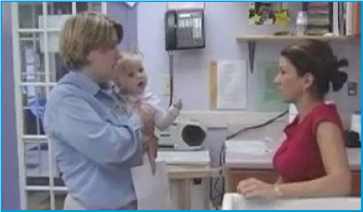
Infants and Toddlers: Daily Health Checks
Children's ability to learn is affected by their state of well-being. Because young children are highly susceptible and prone to infectious illnesses, it is important that teachers conduct daily health checks. As you watch the learning video, Infants and Toddlers: Daily Health Checks , consider the following questions:
What conditions should the teacher note during the health check

Unlock Deck
Unlock for access to all 31 flashcards in this deck.
Unlock Deck
k this deck
20
List the reasons why teachers should conduct daily health checks.

Unlock Deck
Unlock for access to all 31 flashcards in this deck.
Unlock Deck
k this deck
21
Daily health checks are:
a. time consuming and tedious-weekly or biweekly health checks are far more practical
b. time consuming but necessary
c. brief and a source of invaluable information
d. best left to an attending school nurse
a. time consuming and tedious-weekly or biweekly health checks are far more practical
b. time consuming but necessary
c. brief and a source of invaluable information
d. best left to an attending school nurse

Unlock Deck
Unlock for access to all 31 flashcards in this deck.
Unlock Deck
k this deck
22
Discuss how you might respond to a parent who objects to the daily health checks conducted by her child's teacher.

Unlock Deck
Unlock for access to all 31 flashcards in this deck.
Unlock Deck
k this deck
23
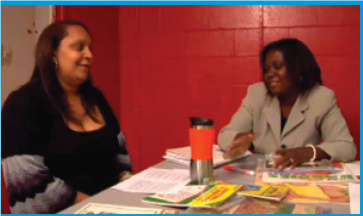
Communicating with Parents about Health in Early Childhood: A Parent-Teacher Meeting
Children ultimately benefit when schools establish meaningful partnerships with their families. Parents also gain from their involvement in children's educational programs. They may become more confident, have an improved understanding of what teachers are trying to accomplish, and develop a greater interest in children's learning. As you watch the learning video, Communicating with Parents about Health in Early Childhood: A Parent-Teacher Meeting , consider the following questions:
Why do you think it is important to schedule a parent-teacher meeting before a child begins to attend classes

Unlock Deck
Unlock for access to all 31 flashcards in this deck.
Unlock Deck
k this deck
24
Chris, the head teacher in the Sunflower classroom, has recently had some concerns about Lynette's vision. He has noticed that during group story time, Lynette quickly loses interest, often leaves her place in the circle, and crawls closer to him in an apparent effort to see the pictures in books he is holding up. Chris has also observed that when Lynette is working on puzzles, manipulatives, or an art project, she typically lowers her head close to the objects. Lynette's parents have also expressed concern about her clumsiness at home.
The results of two vision screening tests, administered by the school nurse on different days, suggest that Lynette's vision is not within normal limits. The nurse shared these findings during a conference with Lynette's parents, and encouraged them to arrange for a follow-up evaluation with an eye specialist. However, because Lynette's father was recently laid off from his job, they no longer have health insurance and cannot afford a doctor's visit at this time. The nurse continued to work closely with the family and helped them locate two reduced-fee health clinics in their community that provided the type of services Lynette required.
If the teacher suspected a vision problem, why didn't he just go ahead and recommend that Lynette get glasses
The results of two vision screening tests, administered by the school nurse on different days, suggest that Lynette's vision is not within normal limits. The nurse shared these findings during a conference with Lynette's parents, and encouraged them to arrange for a follow-up evaluation with an eye specialist. However, because Lynette's father was recently laid off from his job, they no longer have health insurance and cannot afford a doctor's visit at this time. The nurse continued to work closely with the family and helped them locate two reduced-fee health clinics in their community that provided the type of services Lynette required.
If the teacher suspected a vision problem, why didn't he just go ahead and recommend that Lynette get glasses

Unlock Deck
Unlock for access to all 31 flashcards in this deck.
Unlock Deck
k this deck
25
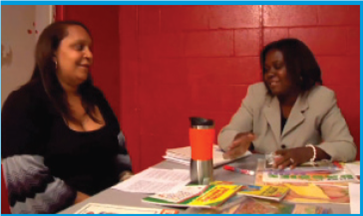
Communicating with Parents about Health in Early Childhood: A Parent-Teacher Meeting
Children ultimately benefit when schools establish meaningful partnerships with their families. Parents also gain from their involvement in children's educational programs. They may become more confident, have an improved understanding of what teachers are trying to accomplish, and develop a greater interest in children's learning. As you watch the learning video, Communicating with Parents about Health in Early Childhood: A Parent-Teacher Meeting , consider the following questions:
What did the teacher do to put the parent at ease and begin to establish a trusting partnership

Unlock Deck
Unlock for access to all 31 flashcards in this deck.
Unlock Deck
k this deck
26
Describe how an elementary teacher might modify the health check procedure to use with schoolage children.

Unlock Deck
Unlock for access to all 31 flashcards in this deck.
Unlock Deck
k this deck
27
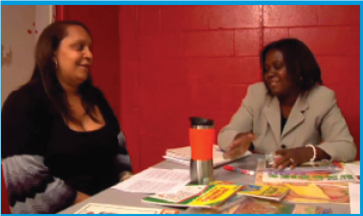
Communicating with Parents about Health in Early Childhood: A Parent-Teacher Meeting
Children ultimately benefit when schools establish meaningful partnerships with their families. Parents also gain from their involvement in children's educational programs. They may become more confident, have an improved understanding of what teachers are trying to accomplish, and develop a greater interest in children's learning. As you watch the learning video, Communicating with Parents about Health in Early Childhood: A Parent-Teacher Meeting , consider the following questions:
What communication skills (e.g., body language, checking for understanding, listening) did the teacher demonstrate during the meeting

Unlock Deck
Unlock for access to all 31 flashcards in this deck.
Unlock Deck
k this deck
28
What benefits do daily health checks provide for children

Unlock Deck
Unlock for access to all 31 flashcards in this deck.
Unlock Deck
k this deck
29
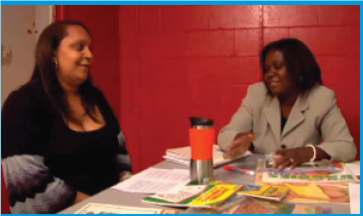
Communicating with Parents about Health in Early Childhood: A Parent-Teacher Meeting
Children ultimately benefit when schools establish meaningful partnerships with their families. Parents also gain from their involvement in children's educational programs. They may become more confident, have an improved understanding of what teachers are trying to accomplish, and develop a greater interest in children's learning. As you watch the learning video, Communicating with Parents about Health in Early Childhood: A Parent-Teacher Meeting , consider the following questions:
Was the teacher successful in communicating the program's health information to the parent What suggestions would you offer to this teacher for improvement

Unlock Deck
Unlock for access to all 31 flashcards in this deck.
Unlock Deck
k this deck
30
Chris, the head teacher in the Sunflower classroom, has recently had some concerns about Lynette's vision. He has noticed that during group story time, Lynette quickly loses interest, often leaves her place in the circle, and crawls closer to him in an apparent effort to see the pictures in books he is holding up. Chris has also observed that when Lynette is working on puzzles, manipulatives, or an art project, she typically lowers her head close to the objects. Lynette's parents have also expressed concern about her clumsiness at home.
The results of two vision screening tests, administered by the school nurse on different days, suggest that Lynette's vision is not within normal limits. The nurse shared these findings during a conference with Lynette's parents, and encouraged them to arrange for a follow-up evaluation with an eye specialist. However, because Lynette's father was recently laid off from his job, they no longer have health insurance and cannot afford a doctor's visit at this time. The nurse continued to work closely with the family and helped them locate two reduced-fee health clinics in their community that provided the type of services Lynette required.
What responsibilities do teachers have when they believe a child has a health impairment
The results of two vision screening tests, administered by the school nurse on different days, suggest that Lynette's vision is not within normal limits. The nurse shared these findings during a conference with Lynette's parents, and encouraged them to arrange for a follow-up evaluation with an eye specialist. However, because Lynette's father was recently laid off from his job, they no longer have health insurance and cannot afford a doctor's visit at this time. The nurse continued to work closely with the family and helped them locate two reduced-fee health clinics in their community that provided the type of services Lynette required.
What responsibilities do teachers have when they believe a child has a health impairment

Unlock Deck
Unlock for access to all 31 flashcards in this deck.
Unlock Deck
k this deck
31
Although a variety of people and organizations are often involved in supporting children's well-being, the primary responsibility for a child's health and health care __________ lies with his or her family.
a. sometimes
b. always
c. ideally
d. most often
a. sometimes
b. always
c. ideally
d. most often

Unlock Deck
Unlock for access to all 31 flashcards in this deck.
Unlock Deck
k this deck


